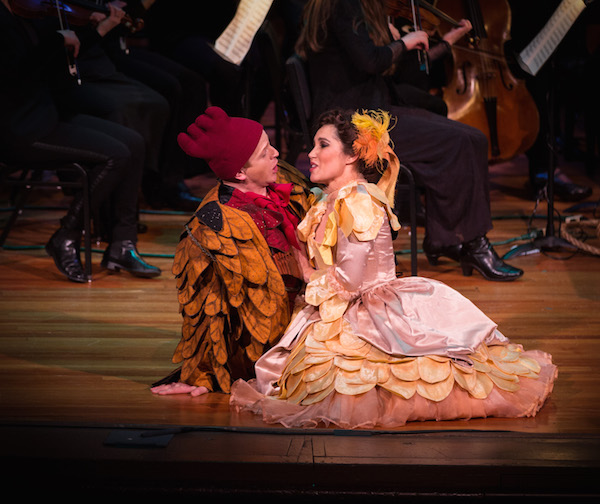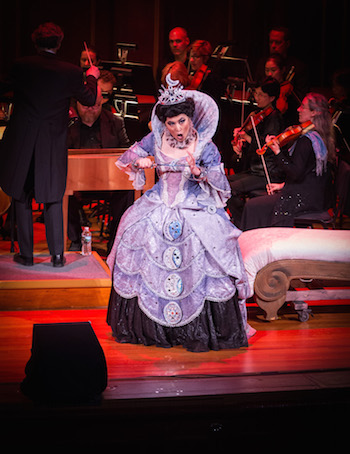Opera Review: A Delightful “Magic Flute” from Boston Baroque
Boston Baroque staged a very enjoyable and entertaining performance of Mozart’s much-loved opera.

Andrew Garland as Papageno and Sara Heaton as Papagena in the Boston Baroque production of “The Magic Flute.” Photo: Kathy Wittman.
By Susan Miron
Twenty seven years ago, Martin Pearlman and the period-instrument ensemble Boston Baroque (then named Banchetto Musicale), gave the US period-instrument premiere of Mozart’s The Magic Flute (Die Zauberflöte). Like its original premiere on September 30, 1791 — with Mozart himself conducting from the keyboard — it was a great success. Last Friday and Saturday nights in NEC’s Jordan Hall, two of this ensemble’s original wind players, flutist Christopher Krueger and oboist Marc Schachman, joined their excellent instrumental and choral colleagues in a very enjoyable and entertaining performance of this much-loved opera.
Actually, Die Zauberflöte is a Singspiel, with spoken dialogue between its musical numbers like other of Mozart’s German-language operas, such as Die Entf¨ürung aus den Serail (The Abduction from the Seragio) with a German libretto by Austrian actor and theatrical producer, Emanuel Schikaneder. Rather than using projected supertitles, Boston Baroque had the singers speak Jeremy Sams’ somewhat jarring — hip or stilted, depending on your point of view — English translation, which is clearly meant to showcase the libretto’s humor. This was my only qualm about an otherwise classy evening.
The singers were all either very good or superb. Soprano So Young Park was a stunning, wonderfully nasty Queen of the Night, a role written originally for Mozart’s sister in-law, Josepha Hofer. Park’s bio states that this is her “signature role,” and one could immediately hear why. She dispatched her coloratura high notes with apparent ease, hitting her stratospherically high Fs twice with aplomb. Her Elizabethan costume and stage manner were also a joy to behold.
Charlie Purdue, Dhruva Schlondorff, and Kevin Liao were a heavenly Three Spirits. Members of the children’s chorus Voices Boston, the three lads sang beautifully. A trio of fetching ladies in silver gowns and tiaras — sopranos Sonja Dutoit Tengblad and Mara Bonde, with the wonderful contralto Emily Marvosh — looked and sounded voluptuous every time they graced the stage. They were quite funny at the opera’s beginning trying to outdo each other to become the “caregiver” of the passed-out, handsome prince Pamino. What a amazing blend of gorgeous voices! (I have admired Tengblad and Marvosh in the Lorelei ensemble many times over the past several years).
Papageno, the lavishly feathered bird-catcher, was sung with charm by baritone Andrew Garland. With his birdwatcher’s cage on his back and a large lock on his mouth, this Papageno was quite hilarious, especially when he tried to sing with nothing but a string of mmm’s coming out. Papageno’s magic bells enchant four large men (later dressed as huge animals) to dance about like mechanical dolls.
Sarastro, the Queen of the Night’s nemesis, sung by the blonde and bearded bass Gustav Andreassen, provided some stunningly beautiful low notes. Other characters who were portrayed and sung well — tenor Stefan Reed and baritone Dana Whiteside as priests and armored men; Whiteside also spoke with a bracingly clarion tone.

So Young Park as Queen of the Night in the Boston Baroque production of “The Magic Flute.” Photo by Kathy Wittman.
One of the most memorable things about this production was the fabulous costumes created by A.T. Jones and Sons (the make-up and hair by Teddy Lopez was also very good). The stage director, Mark Streshinsky, did an admirable job with this semi-staged affair, setting the orchestra in the back of the stage, keeping us focused on the action among the players.
My real reason for attending (besides adoring this opera) was to hear tenor Nicholas Phan, whom I had reviewed for Celebrity Series (see review), and whose Britten CDs I admire greatly. Phan once again thrilled in the role of fairy tale prince Pamino, supplying plenty of élan, charm, and an expressive voice. This part originally was played by Mozart’s close friend Emanuel Schikaneder, a theater director and actor who headed a Singspiel company, who both commissioned and wrote the libretto for Die Zauberflöte. The superb Christopher Krueger provided the sound for Pamino’s magic flute.
For many in the audience the evening’s highlight was Peter Sykes, who played the “magic bells,” which in which performance as a keyed glockenspiel built by Robin Jennings for John Eliot Gardiner’s staging of The Magic Flute several years ago. It was imported for this production from England. Its sound is sparklingly magical, and it brought a huge smile to my face each time I heard it.
Soprano Sarah Heaton was a lovely Pamina (after she took off her old lady’s disguise), Papageno’s feathery bashert (one destined for him), although in their love duet they seemed oddly mismatched in timbre. Tenor Owen MacIntosh, outfitted in spiffy black and gold outfit with a feathered headdress, gave a strong comic characterization of the chief slave Monostatos.
The orchestra was generally very good throughout, although the Boston Baroque’s strings were occasionally overpowered by the winds and brass. The three trombones — Steven Lundahl, Liza Malamut, and Brian Kay — deserve special mention. Christopher Krueger and Peter Sykes were, along with Nicholas Phan and conductor Martin Pearlman, my personal “Magic” quartet.
Susan Miron, a harpist, has been a book reviewer for over 20 years for a large variety of literary publications and newspapers. Her fields of expertise were East and Central European, Irish, and Israeli literature. Susan covers classical music for The Arts Fuse and The Boston Musical Intelligencer. She is part of the Celtic harp and storytelling duo A Bard’s Feast with renowned storyteller Norah Dooley and, until recently, played the Celtic harp at the Cancer Center at Newton Wellesley Hospital.
Tagged: Boston Baroque, Nicholas Phan, Opera
